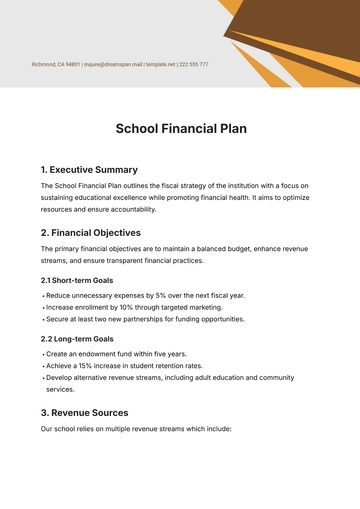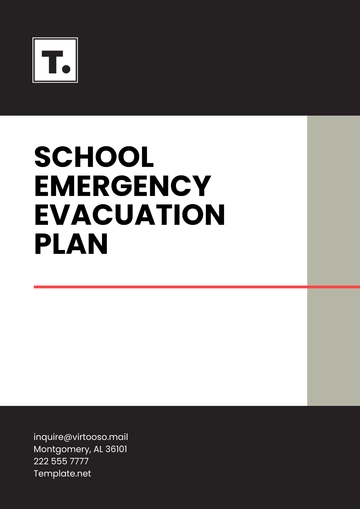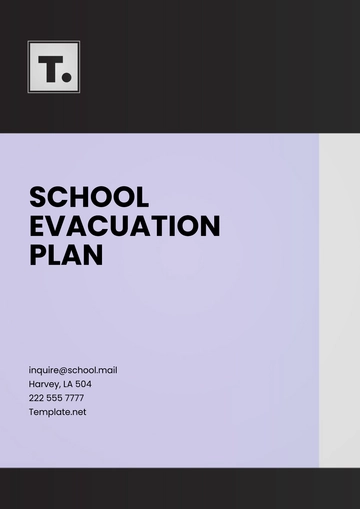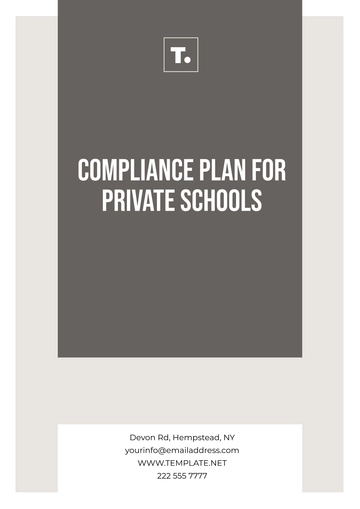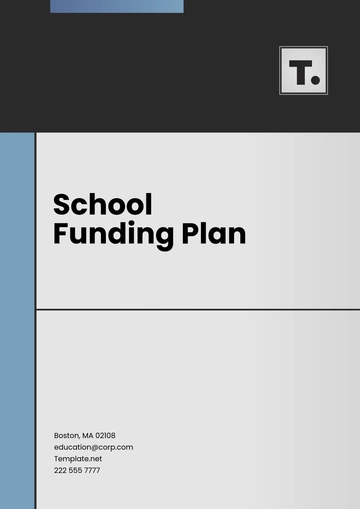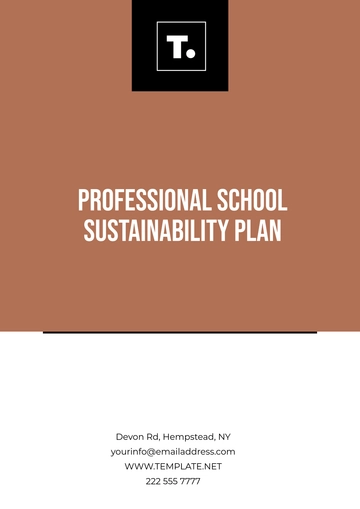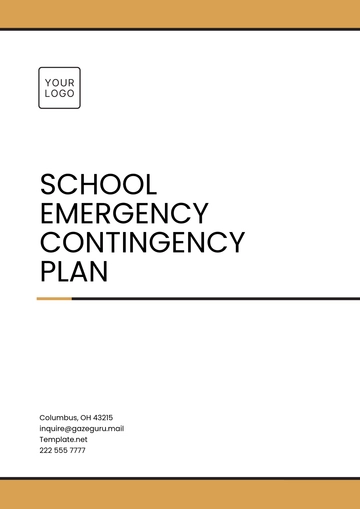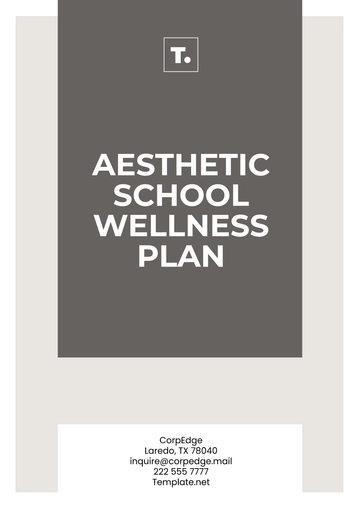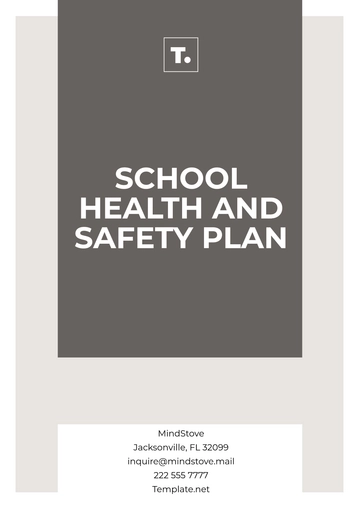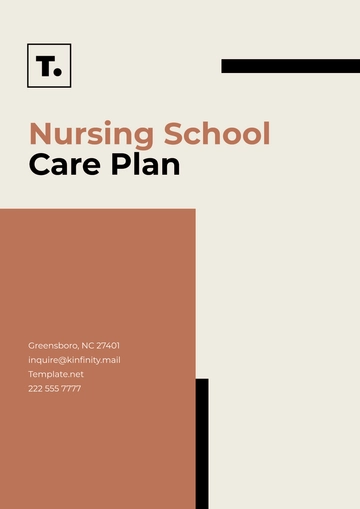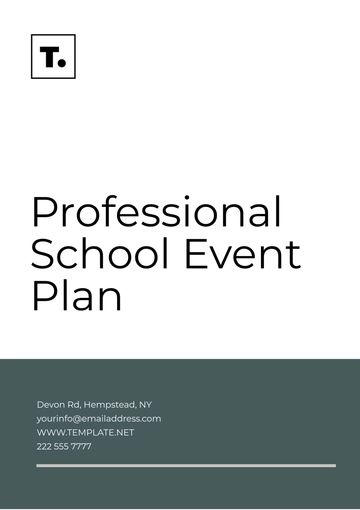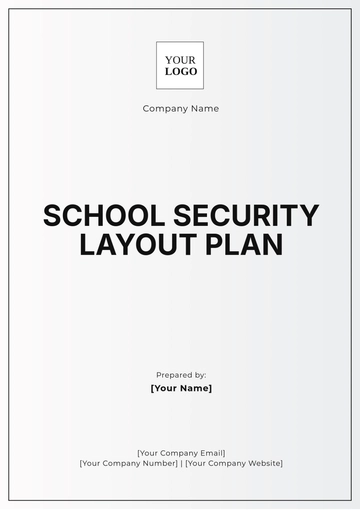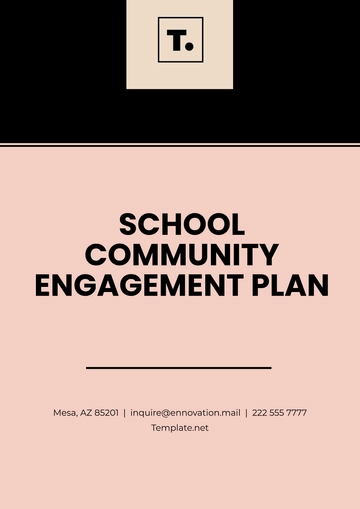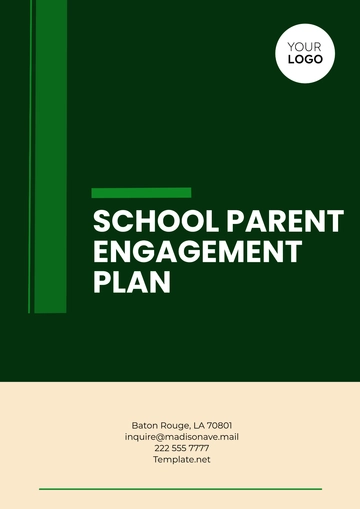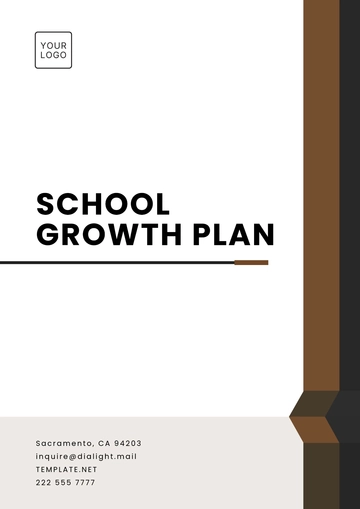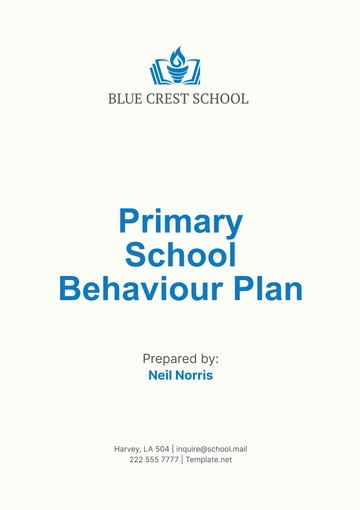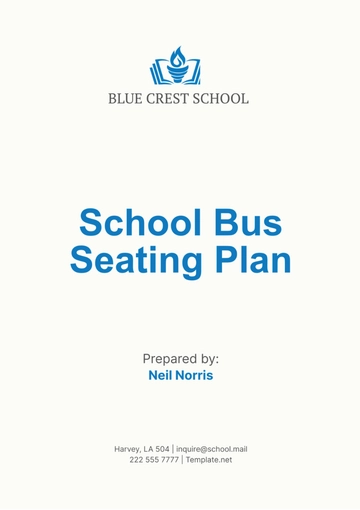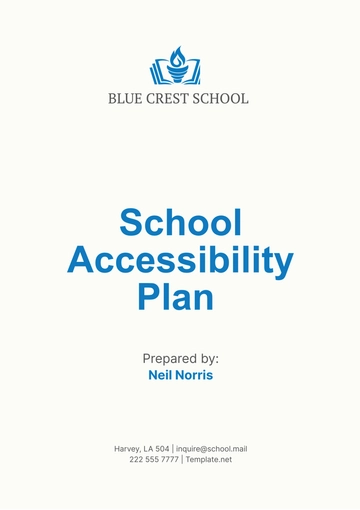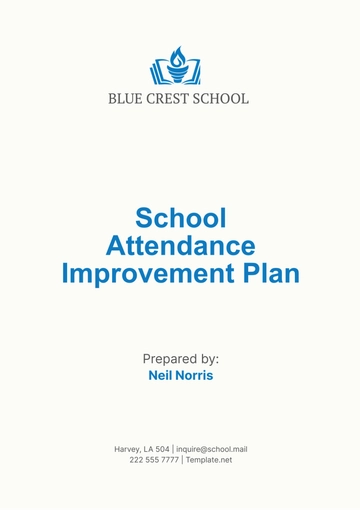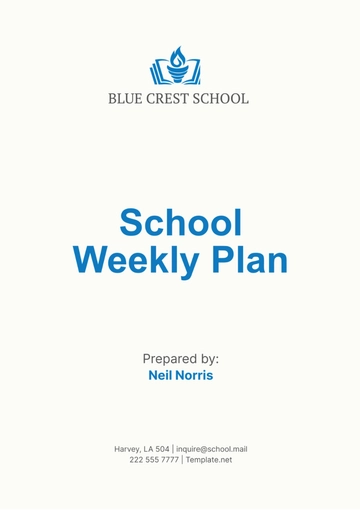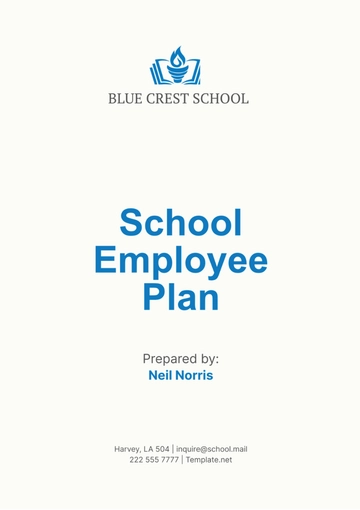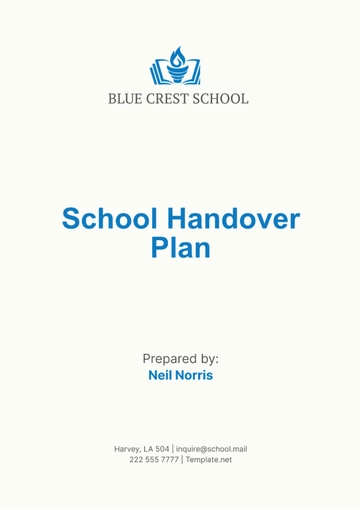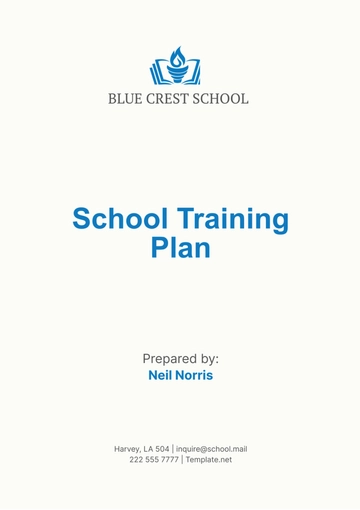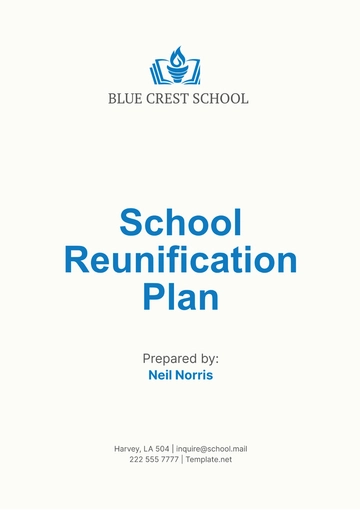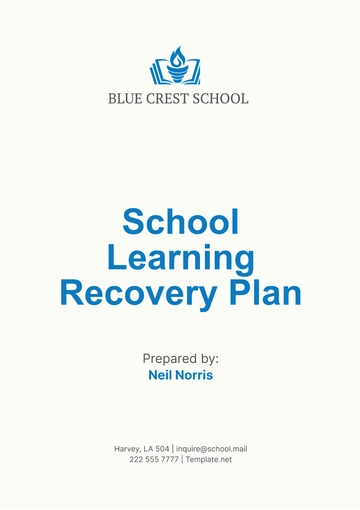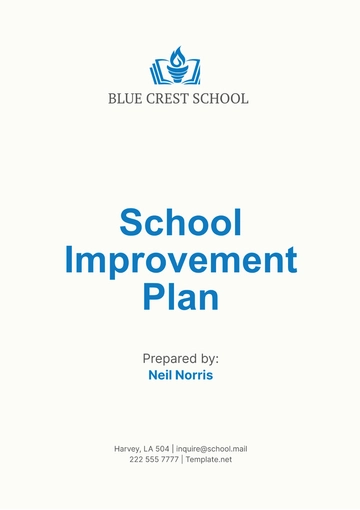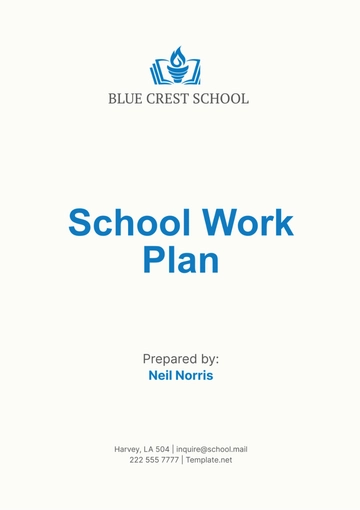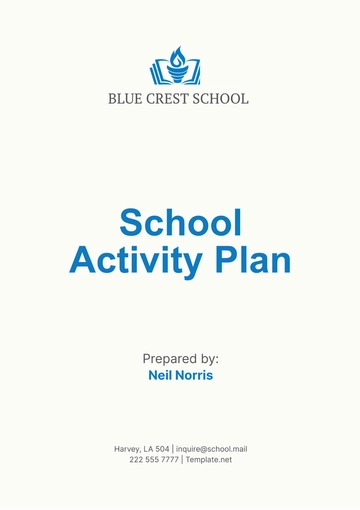Free School Training Plan
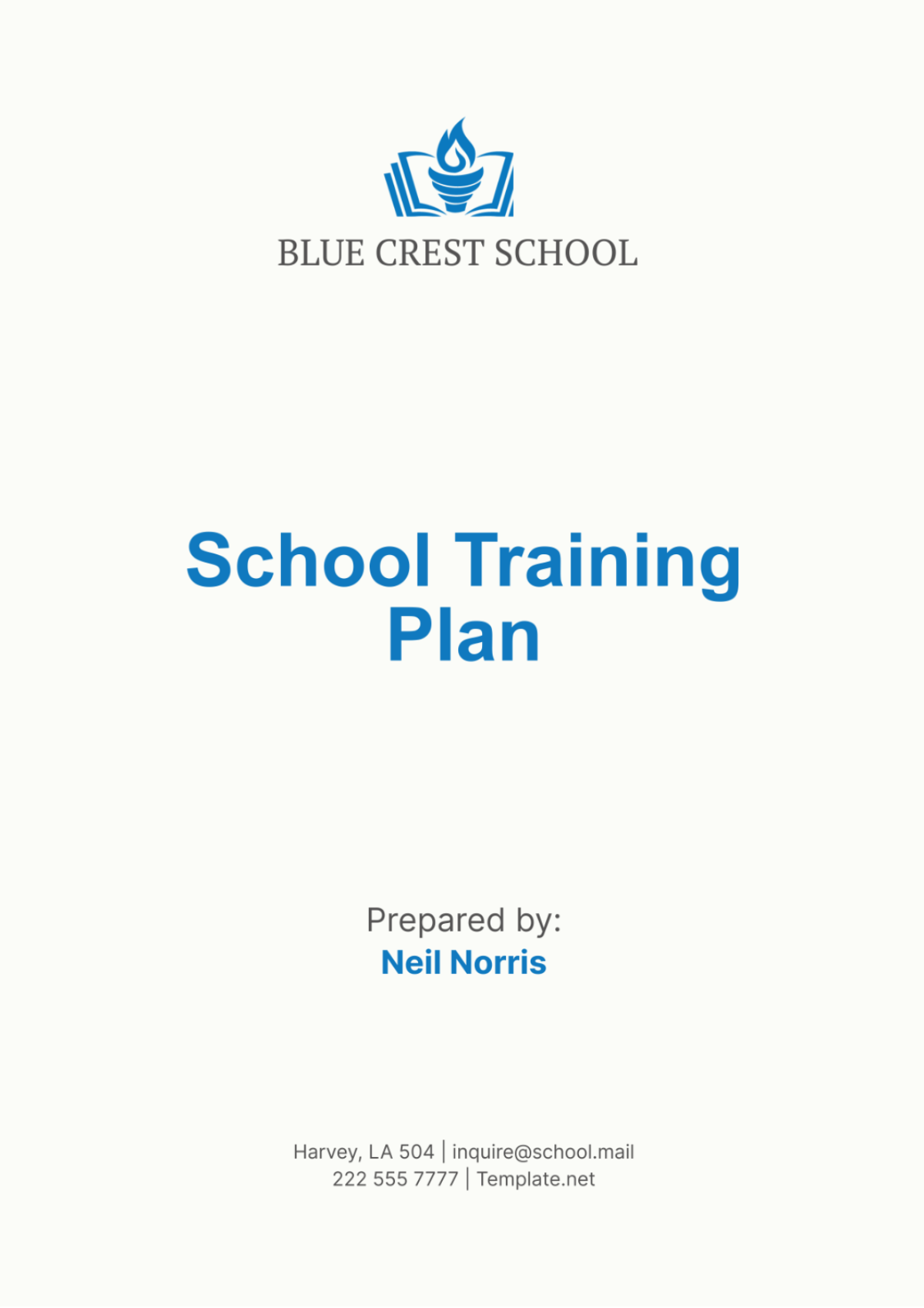
I. Overview
A. Purpose
The School Training Plan serves as a strategic roadmap to enhance the professional development of teachers and staff. By investing in their growth, the plan seeks to elevate the quality of education and subsequently improve learning outcomes for students. Through targeted training initiatives, educators will be equipped with the necessary skills, knowledge, and tools to effectively implement the school's curriculum and instructional strategies. This includes staying abreast of the latest pedagogical trends, technology integration, and student engagement techniques, ensuring a dynamic and impactful learning environment.
Moreover, the plan underscores the institution's commitment to continuous improvement and excellence in education. By fostering a culture of lifelong learning among educators, the school aims to create a positive ripple effect, positively impacting student achievement and school reputation. Regular assessment and feedback mechanisms will be implemented to gauge the effectiveness of the training initiatives and tailor future programs to meet the evolving needs of both educators and students.
B. Alignment with School Goals
The School Training Plan is intricately woven into the fabric of the school's overarching goals and vision. It is designed to complement and further these aspirations by focusing on key areas such as curriculum development, instructional techniques, assessment methods, and classroom management.
By aligning training initiatives with these core areas, the plan ensures that educators are equipped with the necessary skills and knowledge to deliver high-quality education that meets the school's standards of excellence. Additionally, the plan emphasizes the importance of aligning individual professional development goals with the school's broader objectives, fostering a sense of purpose and unity among educators towards a common goal of academic excellence.
C. Inclusivity and Equity
Central to the School Training Plan is its commitment to addressing the diverse needs of students, including those with special needs or from disadvantaged backgrounds. The plan recognizes the importance of promoting inclusive and equitable education practices that cater to the unique learning styles and requirements of all students.
Through targeted training programs, educators will be empowered to create inclusive classroom environments that celebrate diversity and foster a sense of belonging for every student. By embracing inclusivity and equity as core principles, the school aims to create a learning community where every student has the opportunity to thrive and reach their full potential.
II. Training Topics
The School Training Plan's Curriculum Development, Instructional Techniques, Assessment Methods, and Classroom Management sections are designed to enhance educators' skills and knowledge. These sessions ensure alignment with educational standards and best practices, foster student engagement, and promote inclusive and equitable education. Through a comprehensive approach to professional development, educators will be equipped to create dynamic learning environments that support student success.
A. Curriculum Development
Training sessions will provide teachers with the latest methodologies and tools for effective curriculum development, ensuring alignment with educational standards and best practices.
Topic | Description |
|---|---|
1. Introduction to Curriculum Development | This session provides an overview of curriculum development principles, including the importance of alignment with educational standards and best practices. Teachers will learn about the key components of a curriculum, such as learning objectives, assessment methods, and instructional strategies. They will also explore the role of curriculum development in promoting student learning and achievement. |
2. Understanding Educational Standards | Teachers will delve into the various educational standards relevant to their subject area and grade level. They will learn how to interpret and apply these standards to curriculum development, ensuring that their curricula meet the required learning outcomes. Emphasis will be placed on aligning curriculum objectives with standards to create a coherent and effective curriculum. |
3. Designing Learning Objectives | This session focuses on the process of designing clear and measurable learning objectives for curriculum units and lessons. Teachers will learn how to identify the desired outcomes of their curriculum and articulate these outcomes in a way that guides instruction and assessment. They will also explore different types of learning objectives, such as knowledge, skills, and attitudes, and how to integrate them into their curriculum design. |
4. Developing Instructional Strategies | Teachers will explore a range of instructional strategies and methods to enhance student engagement and learning. They will learn how to select and adapt instructional strategies based on the needs of their students and the content being taught. Strategies such as cooperative learning, inquiry-based learning, and technology integration will be covered, with a focus on creating dynamic and interactive learning experiences for students. |
5. Assessment Design | This session covers the design and implementation of various assessment methods to measure student learning. Teachers will learn how to create assessments that align with curriculum objectives and provide meaningful feedback to students. They will explore formative and summative assessment strategies, as well as alternative assessment methods, to ensure a comprehensive approach to assessing student learning. |
6. Integrating Technology in Curriculum Development | Teachers will learn how to effectively integrate technology into their curriculum to enhance teaching and learning. They will explore tools and resources that support curriculum development, such as learning management systems, digital content, and educational apps. Strategies for using technology to differentiate instruction and meet the needs of diverse learners will also be discussed. |
7. Reflecting and Refining Curriculum Development Process | In this session, teachers will reflect on their curriculum development process and identify areas for improvement. They will learn how to gather feedback from students, colleagues, and other stakeholders to refine their curriculum. Teachers will also explore strategies for ongoing professional development in curriculum development, ensuring that they stay current with best practices and continue to enhance their skills in designing effective curricula. |
B. Instructional Techniques
Educators will be trained in innovative instructional techniques that foster student engagement and enhance learning outcomes. This includes technology integration and differentiated instruction strategies.
Topic | Description |
|---|---|
1. Introduction to Instructional Techniques | Educators will be introduced to a variety of innovative instructional techniques aimed at fostering student engagement and enhancing learning outcomes. This session will highlight the importance of using varied instructional strategies to cater to diverse learning styles and preferences, promoting active learning and student participation. Teachers will explore the role of instructional techniques in creating dynamic and effective learning environments. |
2. Technology Integration in Teaching | This session focuses on integrating technology into teaching practices to enhance student learning. Teachers will explore various educational technologies and digital tools that can be used to create interactive and engaging learning experiences. Strategies for incorporating technology into lesson planning, delivery, and assessment will be discussed, with a focus on leveraging technology to enhance student understanding and engagement. |
3. Differentiated Instruction | Educators will learn strategies for differentiating instruction based on students' learning styles, abilities, and interests. Techniques for adapting content, process, and products to meet individual student needs will be explored. The session will emphasize the importance of providing all students with access to meaningful and challenging learning experiences, ensuring that every learner can succeed. |
4. Active Learning Techniques | This session explores a range of active learning techniques designed to promote student engagement and participation. Teachers will learn how to create interactive learning experiences that encourage students to actively construct their knowledge and understanding. Techniques such as group discussions, problem-solving activities, and project-based learning will be covered, with a focus on fostering collaboration and critical thinking skills. |
5. Inquiry-Based Learning | Educators will learn about inquiry-based learning, an approach that encourages students to explore concepts and ideas through questioning and investigation. Teachers will learn how to design inquiry-based lessons that promote curiosity, critical thinking, and problem-solving skills. The session will explore the role of the teacher as a facilitator of learning in an inquiry-based classroom, fostering a student-centered approach to teaching and learning. |
6. Flipped Classroom Model | This session introduces the flipped classroom model, which involves reversing the traditional classroom dynamic by delivering instructional content outside of class and using class time for activities that deepen understanding and application. Educators will learn how to create and implement flipped lessons, including strategies for creating pre-recorded videos, designing interactive activities, and facilitating meaningful discussions in the classroom. |
7. Culturally Responsive Teaching | This session focuses on culturally responsive teaching practices that honor and incorporate students' cultural backgrounds and experiences into the learning process. Educators will learn how to create inclusive classroom environments that celebrate diversity and promote equity and social justice. Strategies for integrating culturally relevant content, teaching approaches, and assessments will be discussed, with a focus on creating meaningful connections between students' lives and the curriculum. |
C. Assessment Methods
The plan includes training on diverse assessment methods, from formative to summative assessments, to effectively measure and support student learning progress.
Topic | Description |
|---|---|
1. Introduction to Assessment Methods | This session provides an overview of various assessment methods used to measure student learning. Educators will learn about the importance of assessment in the teaching and learning process, as well as the different types of assessment, including formative, summative, and diagnostic assessments. The session will also cover the role of assessment in informing instruction and improving student outcomes. |
2. Formative Assessment | Teachers will explore formative assessment strategies aimed at monitoring student learning progress and providing timely feedback for improvement. They will learn how to use formative assessments, such as quizzes, polls, and class discussions, to gauge student understanding and adjust instruction accordingly. The session will emphasize the importance of ongoing, informal assessments in supporting student learning and achievement. |
3. Summative Assessment | This session focuses on summative assessment methods used to evaluate student learning outcomes at the end of a unit or course. Educators will learn how to design and administer summative assessments, such as tests, projects, and presentations, that effectively measure student mastery of learning objectives. Strategies for providing meaningful feedback and using summative assessments to inform instructional decisions will be discussed. |
4. Performance-Based Assessment | Teachers will explore performance-based assessment methods that require students to demonstrate their knowledge and skills in real-world contexts. They will learn how to design authentic assessments, such as projects, portfolios, and performances, that assess student abilities beyond traditional tests. The session will emphasize the value of performance-based assessments in promoting deeper learning and higher-order thinking skills. |
5. Portfolio Assessment | Educators will learn about portfolio assessment as a method for compiling and evaluating student work over time. Teachers will explore how portfolios can showcase student growth and achievement across various subject areas and learning experiences. They will learn how to design and implement portfolios as a tool for assessing student progress and achievement in a comprehensive and meaningful way. |
6. Peer and Self-Assessment | This session introduces educators to peer and self-assessment methods that involve students in evaluating their own work and the work of their peers. Teachers will learn how to incorporate peer and self-assessment activities into their teaching practice to promote student engagement and responsibility for learning. Strategies for providing constructive feedback and promoting peer collaboration will be discussed. |
7. Alternative Assessment Methods | Teachers will explore alternative assessment methods that offer creative and innovative ways to assess student learning. Educators will learn about alternative assessments, such as project-based assessments, simulations, and exhibitions, that allow students to demonstrate their knowledge and skills in authentic contexts. The session will highlight the value of alternative assessments in providing a more holistic and meaningful view of student learning. |
D. Classroom Management
Training will cover classroom management techniques aimed at creating a conducive learning environment. This involves strategies for maintaining discipline, promoting positive behavior, and managing classroom dynamics.
Topic | Description |
|---|---|
1. Establishing Classroom Rules and Expectations | Teachers will learn how to establish clear and consistent rules and expectations for behavior in the classroom. They will explore strategies for communicating these rules to students and ensuring that they understand the consequences of not following them. The session will emphasize the importance of proactive management in setting the tone for a positive and productive learning environment. |
2. Positive Reinforcement | This session focuses on using positive reinforcement to encourage and reward desired behaviors in the classroom. Educators will learn how to identify and acknowledge positive behaviors, such as participation, cooperation, and effort, to reinforce a positive classroom culture. Strategies for implementing a reward system that motivates students to engage in positive behaviors will be discussed, promoting a supportive and encouraging learning environment. |
3. Classroom Arrangement and Organization | Teachers will explore strategies for arranging and organizing the classroom to optimize learning and minimize distractions. They will learn how to create a layout that promotes student engagement and participation, such as seating arrangements that facilitate group work and access to learning materials. The session will also cover techniques for managing classroom resources and materials efficiently, ensuring a well-organized and functional learning environment. |
4. Behavior Management Strategies | Educators will learn a variety of behavior management strategies to address and prevent disruptive behaviors in the classroom. Techniques for de-escalating conflicts, redirecting negative behaviors, and establishing consequences for misbehavior will be discussed. Teachers will also explore proactive approaches to behavior management, such as building positive relationships with students and implementing preventive strategies to minimize disruptions. |
5. Time Management | This session focuses on effective time management strategies for maximizing instructional time and maintaining a structured learning environment. Teachers will learn how to create and follow a daily schedule that allows for smooth transitions between activities and minimizes downtime. Strategies for prioritizing tasks, managing transitions, and maximizing instructional time will be discussed, promoting a more efficient and productive learning environment. |
6. Building Positive Relationships | Teachers will explore the importance of building positive relationships with students to create a supportive and inclusive classroom environment. They will learn strategies for connecting with students on a personal level, such as showing empathy, respect, and understanding. The session will emphasize the role of positive relationships in fostering student engagement, motivation, and academic success, promoting a sense of belonging and community in the classroom. |
7. Collaborative Problem-Solving | This session introduces educators to collaborative problem-solving techniques that involve students in resolving conflicts and addressing classroom issues. Teachers will learn how to facilitate group discussions and activities that encourage students to work together to find solutions. Strategies for promoting active listening, empathy, and cooperation will be discussed, fostering a collaborative and supportive classroom culture. |
III. Training Schedule
The training schedule will span the entire academic year, starting in January 2050. Training sessions will be conducted monthly, with additional intensive workshops during the summer break.
Month | Training Focus | Description |
|---|---|---|
January | Introduction to Curriculum Development | This session will provide an overview of curriculum development principles and the importance of aligning curriculum with educational standards. Teachers will begin to explore the curriculum development process and its impact on student learning. |
February | Technology Integration in Teaching | Educators will learn how to integrate technology into their teaching practices to enhance student engagement and learning outcomes. Strategies for incorporating technology into lesson planning and delivery will be discussed. |
March | Differentiated Instruction | Teachers will explore strategies for differentiating instruction to meet the diverse needs of students. They will learn how to adapt content, process, and products to accommodate varying learning styles and abilities. |
April | Assessment Methods | This session will cover a range of assessment methods, including formative and summative assessments, to measure student learning progress. Educators will learn how to design assessments that align with curriculum objectives. |
May | Classroom Management | Educators will learn effective classroom management techniques to create a conducive learning environment. Strategies for maintaining discipline and managing classroom dynamics will be discussed. |
June | Performance-Based Assessment | Teachers will explore performance-based assessment methods that require students to demonstrate their knowledge and skills in real-world contexts. They will learn how to design authentic assessments that assess student abilities beyond traditional tests. |
July | Portfolio Assessment | This session focuses on portfolio assessment as a method for compiling and evaluating student work over time. Teachers will learn how to design and implement portfolios as a tool for assessing student progress and achievement. |
August | Reflecting and Refining Curriculum Development Process | Educators will reflect on their curriculum development process and identify areas for improvement. They will learn how to gather feedback from students and colleagues to refine their curriculum for the upcoming academic year. |
September | Active Learning Techniques | Teachers will explore a variety of active learning techniques designed to promote student engagement and participation. They will learn how to create interactive learning experiences that encourage student collaboration and critical thinking. |
October | Inquiry-Based Learning | Educators will learn about inquiry-based learning and how to design lessons that promote student curiosity and problem-solving skills. The session will emphasize the role of the teacher as a facilitator of learning in an inquiry-based classroom. |
November | Flipped Classroom Model | This session introduces the flipped classroom model, where instructional content is delivered outside of class, and class time is used for activities that deepen understanding. Educators will learn how to create and implement flipped lessons. |
December | Culturally Responsive Teaching | Teachers will explore culturally responsive teaching practices that honor and incorporate students' cultural backgrounds into the learning process. Strategies for creating an inclusive classroom environment will be discussed. |
IV. Evaluation and Feedback
The Evaluation and Feedback section of the School Training Plan focuses on continuous improvement and relevance. Regular evaluations, including quarterly reviews, will gauge the effectiveness of training sessions and their impact on teaching practices. An open feedback loop will allow teachers and staff to provide input, ensuring that the training program remains responsive to the evolving needs of educators.
A. Regular Evaluation
Regular evaluation mechanisms will be integrated into the training plan. Quarterly reviews will assess the effectiveness of the training sessions and their impact on teaching practices.
Evaluation Type | Description |
|---|---|
Quarterly Reviews | Conducted every three months to assess the effectiveness of training sessions and their impact on teaching practices. |
Observation | Classroom observations will be conducted to evaluate how teachers apply the skills and knowledge gained from training. |
Surveys | Surveys will be administered to gather feedback from participants regarding the relevance and effectiveness of the training. |
B. Feedback Mechanisms
An open feedback loop will be established, allowing teachers and staff to provide input on the training program. This will ensure the plan remains relevant and addresses the evolving needs of educators.
Mechanism | Description |
|---|---|
Surveys | Surveys will be conducted periodically to gather feedback on the overall training program, including session content and delivery. |
Focus Group Discussions | Focus group discussions will be organized to delve deeper into specific aspects of the training program and gather in-depth feedback. |
Individual Interviews | Individual interviews will be conducted with select participants to gain a more personalized understanding of their feedback and needs. |
Suggestion Box | A suggestion box will be placed in a central location for participants to anonymously submit feedback, suggestions, and comments. |
V. Resources and Support
The Resources and Support section of the School Training Plan emphasizes providing comprehensive support to participants. All necessary training materials, such as handouts and digital resources, will be readily available to ensure educators have the tools they need. Additionally, a dedicated support system will be in place to assist teachers and staff in implementing new practices learned during training sessions, fostering a supportive environment for professional growth.
A. Training Materials
All necessary training materials, including handouts, digital resources, and instructional guides, will be provided to participants.
Resource Type | Description |
|---|---|
Handouts | Comprehensive handouts will be provided to participants, summarizing key concepts and strategies covered in the training sessions. |
Digital Resources | Access to digital resources, such as presentations, videos, and online articles, will be provided to supplement learning and provide additional insights. |
Instructional Guides | Detailed instructional guides will be available to help participants implement new practices and strategies in their teaching practices. |
Curriculum Materials | Relevant curriculum materials, including sample lesson plans and teaching resources, will be provided to support curriculum development and implementation. |
B. Support System
A dedicated support system will be in place to assist teachers and staff during the implementation of new practices learned during the training sessions.
Support Component | Description |
|---|---|
Mentorship Program | Experienced mentors will be available to provide guidance and support to participants as they implement new practices in their classrooms. |
Peer Support Networks | Peer support networks will be established to facilitate collaboration and knowledge sharing among participants, fostering a community of practice. |
Online Discussion Forums | Online forums will be set up to allow participants to ask questions, share resources, and engage in discussions related to the training program. |
Ongoing Professional Development | Opportunities for ongoing professional development will be provided to ensure participants continue to grow and develop in their roles. |
VI. Conclusion
The School Training Plan is a strategic initiative aimed at nurturing a culture of continuous improvement and professional growth within our educational institution. By prioritizing the development of our educators, we are not only investing in their individual success but also in the collective advancement of our school community. This plan underscores our commitment to providing high-quality education and fostering an environment where both educators and students can thrive.
Through this training plan, we seek to equip our teachers and staff with the necessary skills, knowledge, and resources to excel in their roles. By embracing innovative instructional techniques, staying abreast of the latest educational trends, and fostering a supportive learning environment, we aim to enhance the overall quality of education and ensure that every student receives the best possible learning experience. This plan is not just a series of training sessions; it is a strategic framework that will guide our efforts in achieving excellence in education for years to come.
- 100% Customizable, free editor
- Access 1 Million+ Templates, photo’s & graphics
- Download or share as a template
- Click and replace photos, graphics, text, backgrounds
- Resize, crop, AI write & more
- Access advanced editor
Simplify your school training planning with our School Training Plan Template from Template.net. This fully editable and customizable document is designed to meet your specific needs. Best of all, it's editable in our AI Editor Tool for seamless modifications. Elevate your training programs effortlessly. Streamline your preparation process today with a professionally designed template that saves time and enhances efficiency!
You may also like
- Finance Plan
- Construction Plan
- Sales Plan
- Development Plan
- Career Plan
- Budget Plan
- HR Plan
- Education Plan
- Transition Plan
- Work Plan
- Training Plan
- Communication Plan
- Operation Plan
- Health And Safety Plan
- Strategy Plan
- Professional Development Plan
- Advertising Plan
- Risk Management Plan
- Restaurant Plan
- School Plan
- Nursing Home Patient Care Plan
- Nursing Care Plan
- Plan Event
- Startup Plan
- Social Media Plan
- Staffing Plan
- Annual Plan
- Content Plan
- Payment Plan
- Implementation Plan
- Hotel Plan
- Workout Plan
- Accounting Plan
- Campaign Plan
- Essay Plan
- 30 60 90 Day Plan
- Research Plan
- Recruitment Plan
- 90 Day Plan
- Quarterly Plan
- Emergency Plan
- 5 Year Plan
- Gym Plan
- Personal Plan
- IT and Software Plan
- Treatment Plan
- Real Estate Plan
- Law Firm Plan
- Healthcare Plan
- Improvement Plan
- Media Plan
- 5 Year Business Plan
- Learning Plan
- Marketing Campaign Plan
- Travel Agency Plan
- Cleaning Services Plan
- Interior Design Plan
- Performance Plan
- PR Plan
- Birth Plan
- Life Plan
- SEO Plan
- Disaster Recovery Plan
- Continuity Plan
- Launch Plan
- Legal Plan
- Behavior Plan
- Performance Improvement Plan
- Salon Plan
- Security Plan
- Security Management Plan
- Employee Development Plan
- Quality Plan
- Service Improvement Plan
- Growth Plan
- Incident Response Plan
- Basketball Plan
- Emergency Action Plan
- Product Launch Plan
- Spa Plan
- Employee Training Plan
- Data Analysis Plan
- Employee Action Plan
- Territory Plan
- Audit Plan
- Classroom Plan
- Activity Plan
- Parenting Plan
- Care Plan
- Project Execution Plan
- Exercise Plan
- Internship Plan
- Software Development Plan
- Continuous Improvement Plan
- Leave Plan
- 90 Day Sales Plan
- Advertising Agency Plan
- Employee Transition Plan
- Smart Action Plan
- Workplace Safety Plan
- Behavior Change Plan
- Contingency Plan
- Continuity of Operations Plan
- Health Plan
- Quality Control Plan
- Self Plan
- Sports Development Plan
- Change Management Plan
- Ecommerce Plan
- Personal Financial Plan
- Process Improvement Plan
- 30-60-90 Day Sales Plan
- Crisis Management Plan
- Engagement Plan
- Execution Plan
- Pandemic Plan
- Quality Assurance Plan
- Service Continuity Plan
- Agile Project Plan
- Fundraising Plan
- Job Transition Plan
- Asset Maintenance Plan
- Maintenance Plan
- Software Test Plan
- Staff Training and Development Plan
- 3 Year Plan
- Brand Activation Plan
- Release Plan
- Resource Plan
- Risk Mitigation Plan
- Teacher Plan
- 30 60 90 Day Plan for New Manager
- Food Safety Plan
- Food Truck Plan
- Hiring Plan
- Quality Management Plan
- Wellness Plan
- Behavior Intervention Plan
- Bonus Plan
- Investment Plan
- Maternity Leave Plan
- Pandemic Response Plan
- Succession Planning
- Coaching Plan
- Configuration Management Plan
- Remote Work Plan
- Self Care Plan
- Teaching Plan
- 100-Day Plan
- HACCP Plan
- Student Plan
- Sustainability Plan
- 30 60 90 Day Plan for Interview
- Access Plan
- Site Specific Safety Plan
